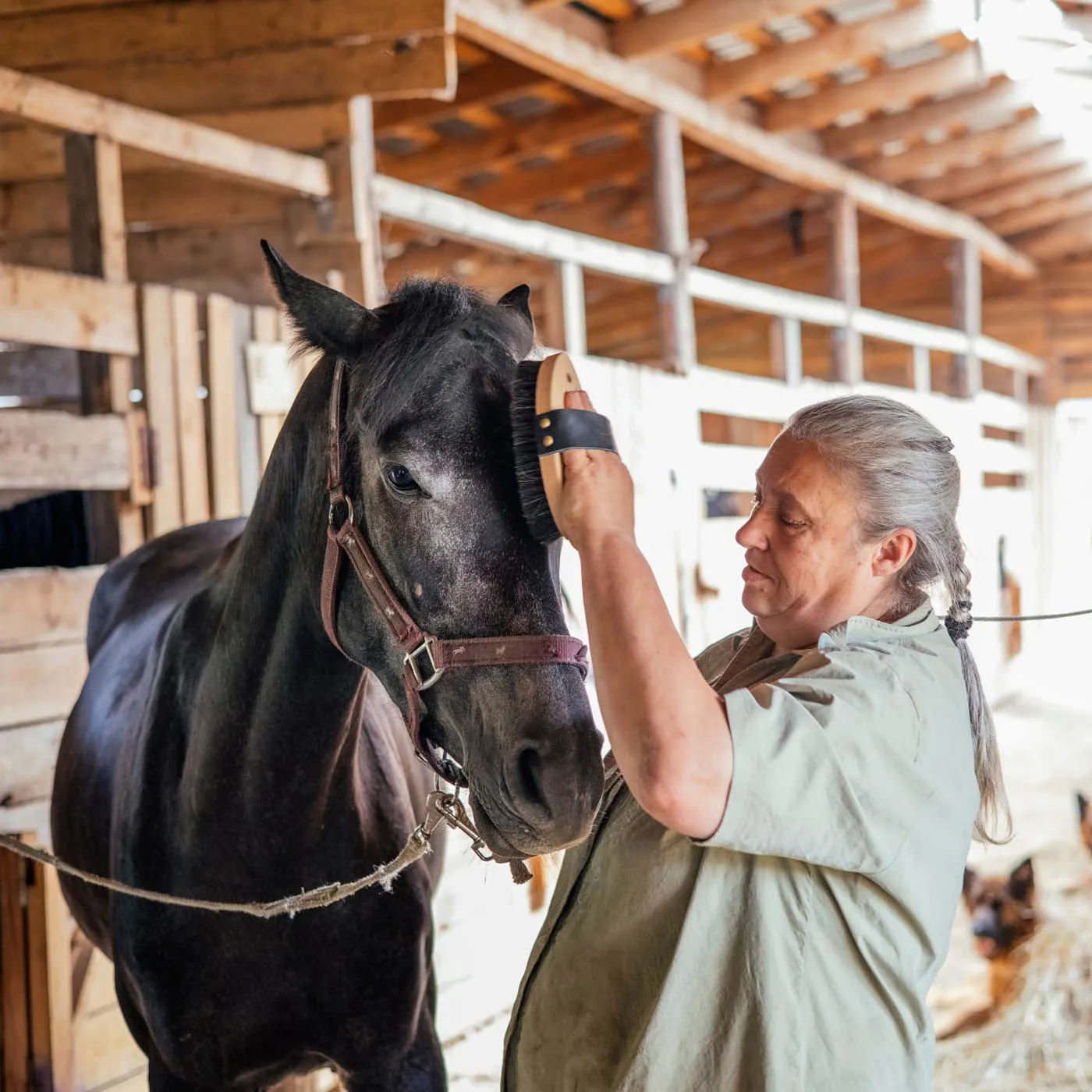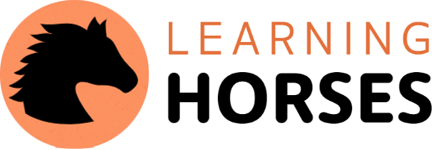The day you realize that your old horse needs to be retired can be heartbreaking. But it doesn’t have to be. Even if it’s time to transition your old horse from your everyday riding pal to a retiree doesn’t mean that your journey together is over, it just means that it’s changing.
Horses are retired for many different reasons, two of the most common reasons horses are retired are age and injury (or a combination of the two). When you retire your older horse, there are big decisions to be made. For horses, there are many different forms of retirement, and the retirement you choose should reflect your horse’s unique personality, physical needs, and social needs.
How to Decide When to Retire your Horse
Thanks to modern research informing how we feed and provide medical care to horses, today it is not uncommon for a horse to live into its 20s and 30s. I have known horses going strong and enjoying retirement well past their 30th birthday! For more horses, retirement starts slowly around 15 or 16 years of age, but many semi-retired horses can be saddled up and gently ridden through their 20s.
As you decide when to retire your horse, you should make your decision based on your individual horse’s health and performance, not just because someone said “your horse is too old to ride or compete.” (Two of the horses competing in the Olympics in 2012 were 19 years old! Not every horse will be performing at peak at 19 years old, but it demonstrates that every horse is different and will need a different retirement age.) You, your veterinarian, and your riding coach can collaboratively decide when it’s time to retire your horse.
What is the right age to retire a horse?
The right retirement age depends on your individual horse. If you have been riding your horse recently and they seem stiff and sore after even small workouts, that could indicate that they need to have all riding stop immediately- or by collaborating with your veterinarian you might find that the right supplement and regular exercise routine keep them supple and moving without pain.
If you are aware that your horse is getting older and that they are moving slower but still love being ridden, it might be best to gradually retire them. Before a complete retirement, move them down to one small ride a week to keep their muscles working. Eventually, it could move to a lunge every week. Regular exercise keeps old horses moving, muscles flexing, and helps their minds stay sharp.
Whatever strategy you use, make sure you don’t just abandon your old horse in a back pasture and leave them to themselves. While some horses like being left alone to graze with their herd, others can become quite depressed when they’re no longer given attention from their human companions.
In the rest of this article, you’ll find out 10 tips to help you give your horse a happy and healthy retirement.
10 Ways to Retire an Old Horse & Keep them Happy
Let your retired horse be social
Horses are social creatures. They may prefer humans or other horses, but rarely does a horse like to be isolated. If your horse prefers the company of other animals, you might want to consider pairing them with a small pony or even a goat as companion! Goats are wonderful friends for horses and are used widely across the equine industry as companions to calm down anxious horses. When I visited Isabella Worth’s stable in Germany, several of the priceless dressage horses were stabled, turned out, and given day to day care all in the company of a tiny pony companion.

Maybe your horse prefers your company over other people and horses? If that’s the case, consider popping a lead rope on and taking them for a stroll around the property. You could sit in the pasture with them and much on some snacks. You have likely spent many years bonding with your horse, this shouldn’t change just because they have had to retire. Many of the activities that can be safely enjoyed with horses on stall rest can be used as ways to spend quality time with an old horse in retirement.
Monitor Your Old Horses Health
Old horses may experience more health issues as they get older. Since horses can’t talk, they will often try to tell you they aren’t feeling well via their behavior and attitude. A horse that’s suddenly reactive or begins mouthing everything in sight may be communicating pain. Their body condition will also indicate their current health, so you should regularly observe them for any subtle changes in weight, skin health, or coat condition.
Give Retired Horses Quality Food
Now that your old horse isn’t competing, it may be tempting to downgrade the quality of their feed or expect them to live only on grass and hay, but balanced nutrition is incredibly important for a horse’s health. As horses get older, they have more trouble getting nutrition from food. By giving them high-quality food into retirement, you can help your old horse to receive all the nutrition they need to stay healthy.
Feed your Old Horse more regularly
Because of the way horses digest food, their health is maintained (and colic averted) by having fiber constantly passing through their gastrointestinal system. This is why horses graze almost all day. Older horses don’t retain as much nutrition from each meal, so giving them one very large meal each day means they have less fiber in their system over the course of the day to keep their gut moving. By, instead feeding your old horse multiple small servings of feed, their health is supported and they are able to retain much more of the nutrition.
Feed them away from other horses
Other horses may challenge your older horse for their food. Even if your horse was once alpha in their herd, as they age they’ll drop lower on the herd pecking order. If you want to ensure that your old horse can eat in peace without being bullied by other horses or having its meal stolen by a dominant horse, adopt an alternate feed plan.
Many owners of old horses feed their old horse somewhere separate from the rest of the herd (like a stall) while other old horse owners prefer the convenience of feeding using horse feed bags. Both of these methods not only ensures they get all of their allocated food, but also prevent fighting and possible injuries to horses.
Monitor their water intake
Low consumption of water can lead to colic and colic is often deadly for horses. To help make sure your horse is drinking enough water, make sure the water isn’t frozen, too cold, or too hot. Horses do not like freezing cold or very hot water, so make sure you monitor the temperature of their water when temperatures are extreme. One important element of hot weather care for horses is making sure that you regularly change out warm, standing water with fresh, cool (not frigid!) water.
If you notice your horse isn’t drinking enough, you can try giving them a salt lick. The salt will make them thirsty and encourage them to drink. If you are still having issues getting them to drink enough, consider adding a small amount of molasses to make the water tastier for them. It is also important to consult your vet if you are ever concerned about your horse’s water intake. It could indicate that your horse is at elevated risk of colic or already is unwell and needs medical treatment.
Make sure your retired horse keep moving

Horses need to move to stay healthy. The anatomy of a horse is unique- the movement of the hooves and legs actually supplements their heart to keep their blood circulating around their body. Without enough movement, your horse is more likely to go lame or develop an illness. You can encourage movement by making sure your horse has access to grazing, taking them for a walk, or by being creative with their food placement each day. If you are giving them hay, spread it out across their pasture or lot.
Groom them
Keeping their coat healthy is important for your older horse’s health and happiness. A coat that is not looked after is more likely to be itchy and sore. Grooming also allows them to spend some time with you and bond. You used to spend a lot of time with your old horse- there’s a good chance they miss you!
Give them any special equipment they may need
Older horses often have more trouble keeping their weight up, their coats healthy, and their health functioning at its best. This means that your old horse may need some extra equipment to help them stay healthy. If you find they are losing too much weight in winter, give them a warm, cozy rug so they won’t have to burn as many of the precious calories from their meals staying warm. Consider thick stall mats for your old horse’s stall to help cushion tired bones, or purchasing feeds formulated just for senior horses.
Your horse has given you the best years of their life, it’s time to spoil them and look after them in their retirement.
Get your Old Horse regular check-ups
It can be tempting to save money by skipping vet visits for “pasture ornament” retired horses who seem to be thriving in their retirement, but it’s a good idea to get regular check-ups for your old horse. If you can catch medical issues and special needs early, they are often quite manageable. Your vet will also be able to give you advise on managing your old horse’s exercise or nutrition needs in retirement.
Final Thoughts on Caring for Old Horses in Retirement
One of the great privileges of being a horseback rider is the bonds we are able to form with our equine companions over decades. While other pet owners have relatively brief spans to enjoy with their pets, horse owners often get to enjoy years of enjoyment and years of retirement for beloved horses. While some older horses are passed lovingly along, family to family, where they happily tote generations of young beginner riders through their first riding lessons, for those of us who can’t quite part with our equine companion, horse retirement is a loving, humane, and gentle way to care for these senior horses.
For more information on caring for senior horses, see the University of Minnesota’s resource guide to caring for senior horses.
